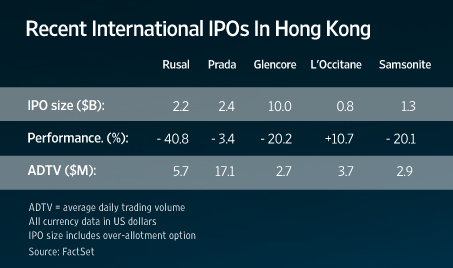HONG KONG (Dow Jones Investment Banker) – The Stock Exchange of Hong Kong’s growing effort to secure international listings speaks volumes about the possible threat posed by the Shanghai international board – when it eventually happens. Recent attempts, however, have been disappointing and HKEx should take stock of Kuala Lumpur’s (KL’s) Bursa Malaysia. Staying local has proved worthwhile.
Xu Ming, the Shanghai Stock Exchange’s executive vice-president, went on record Monday to say that its long-awaited international board was finally ready for launch. However, the announcement yet again fell short of stating a clear timetable, prompting market observers to comment that it could still take time to become fully operational.
Meanwhile, HKEx has been busy marketing around the world to secure listings by international corporates. Its brochure promises higher valuations and the dream of raising yuan-denominated equity offshore. Apparently that’s what foreign issuers are most interested in. But there’s a clear shortage of attractive precedents, with Hui Xian Real Estate Investment Trust (the only CNH-denominated equity security) still trading 34% below its IPO price. The exchange also places high hopes on the opening up of China’s markets, which it believes will see a significant influx of high-frequency traders from the mainland that will more than counterbalance revenue lost to Shanghai from equity issuers.
Hong Kong has successfully managed to achieve a positive re-rating for companies that were previously listed elsewhere and in Singapore in particular.
[Click HERE for my column “LANDSCAPE: It’s The Liquidity, Stupid” of 23 August 2011].
The exchange also now recognizes issuers from 18 new jurisdictions in addition to the four “legacy” ones of Hong Kong, Mainland China, Bermuda and the Cayman Islands. However, international listings haven’t exactly yielded sterling results for investors. Obviously macro events haven’t helped, but, with a handful of exceptions, trading volumes – especially in relation to the size of these IPOs – appear simpl y to point to a relative lack of interest from the market for new foreign entrants.
Those companies that listed by way of introduction – Kazakhmys PLC, Prudential PLC or Vale SA for example – haven’t seen much of an active market develop in their shares. Some days actually recorded no trading at all. This is perhaps no surprise for those names, but international companies that have conducted bona fide IPOs, especially from Europe, have also seen not only a poor showing in terms of their share price performance but also fairly modest aftermarket volumes:

By way of comparison, recent IPOs of a similar size, but with a more “local” flavor, have seen significantly more active trading. Sun Art Retail Group Ltd, which listed in a US$1.24 billion IPO last summer, and whose share price is now 53.6% above the offer price, traded US$9.4 million per day on average over the last 30 days. Similarly, CITIC Securities Co. Ltd, which listed in Hong Kong in a US$1.8 billion IPO last month, is up 12.8%, with an ADTV of US$39 million.
Could it be that Hong Kong should instead focus more on local stocks – securities that Hong Kong investors understand better, and with which they are more comfortable? The example of Bursa Malaysia, especially compared with its more cosmopolitan rival, Singapore’s SGX, is interesting in this respect.
Constituents of the index in KL are far more dependent on domestic revenues, deriving almost 80% of turnover locally as compared with only just over 40% for the top companies in neighboring Singapore. And while daily volumes in KL are on average less than half those seen on SGX, over the last three years it’s been able to successfully welcome very large, multi-billion dollar IPOs, with a mean size close to 30% larger than in Singapore.
The levels of subscription for these deals have also been about three times as high, thanks to a much deeper pool of domestic investors, with assets under management in excess of US$230 billion equivalent. Here the contrast is even more marked, since Singapore’s ever-present sovereign wealth fund Temasek Holdings accounts for about 80% of domestic equity holdings. The result: IPOs have traded up almost 28% since listing in Malaysia, as compared with a decline of 17% in the Lion City since 2009, and a P/E ratio that’s at a premium.
Of course, there are other factors. And with the highest market capitalization as a percentage of GDP (a staggering 1,380%) among all Asia Pacific exchanges, Hong Kong may have little choice than to open up to the rest of the world.
But, so far, the market is not impressed.
(Philippe Espinasse worked as an investment banker in the U.S., Europe and Asia for more than 19 years and now writes and works as an independent consultant in Hong Kong. Visit his website at https://www.ipo-book.com. Readers should be aware that Philippe may own securities related to companies he writes about, may act as a consultant to companies he mentions and may know individuals cited in his articles. To comment on this column, please email [email protected]).
[This article was originally published on Dow Jones Investment Banker on 15 November 2011 and is reproduced with permission.]
Copyright (c) 2011, Dow Jones & Company, Inc.
